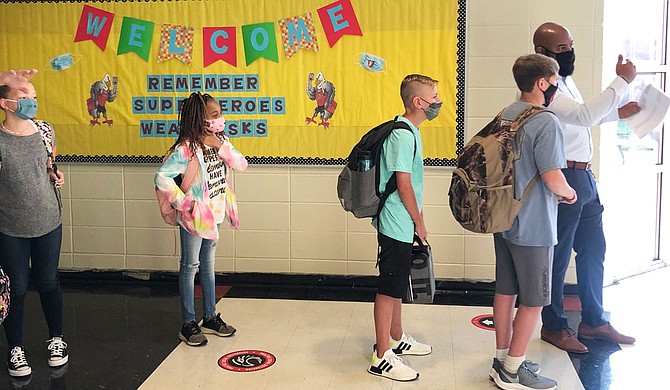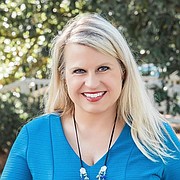Mississippi’s school districts are returning to traditional, full-sized, in-person classes, against the warnings of Mississippi’s leading health experts. Photo courtesy RCSD
It was mid-July when Dr. Jennifer Bryan received the Rankin County School District's "Smart Restart Plan," a comprehensive document establishing the structure and guidelines of the upcoming fall semester. Her name and title were displayed at the document's closing, a message to Rankin County families that the district had sought the approval and expertise of a wide range of professionals.
Bryan is chairwoman of the board of trustees of the Mississippi State Medical Association, the state's largest physician organization and public-health advocacy group. Her Flowood medical practice and representation of a broad field of physicians made her a natural choice for RCSD's Smart Restart Task Force, a team of experts and community stakeholders meant to ensure the district's back-to-school plans properly served the county.
The plan itself painted a picture of a school year as close to normal as was possible, with a heavy focus on sanitation practices.
There was only one problem: She had firmly rejected the plan.
"We had the meeting, and very vocally I said, 'we don't need to do traditional, we need to go hybrid at least, and virtual needs to be a big part of that.' And then they sent out the letter, publicly, to all the parents, with my title in it, and the whole Smart Restart Traditional Plan," Bryan told the Jackson Free Press in an interview.
The first "enhanced" traditional plan offered limited protection against the spread of COVID-19 at best. It encouraged masks, but made them optional in all settings other than buses.
The document described contingency plans for hybrid and virtual learning options, but they focused on worst-case scenarios. Full classes and in-person teaching formed the baseline for RCSD, against the advice of Bryan and State Health Officer Dr. Thomas Dobbs.
RCSD Superintendent Dr. Sue Townsend sent the entire task force an apology shortly after publicly sending out the plan bearing their names. "Dear Task Force," it read, "I had every intention of sending you the plan before it went live, but I got in a hurry and forgot."
Bryan requested another conversation with Townsend after the release of the plan to reiterate her warnings and those of Dobbs, and health experts across the nation. "Traditional is not best practices," Bryan told her. She worried that the inclusion of the task force's names and titles in the document implied to parents that they had signed off on the document—in fact, they'd never seen it before.
As September arrived, with thousands of students already quarantined across Mississippi in just a matter of weeks, Rankin's public-school students and teachers are returning to traditional in-person classes.
Educators from across Rankin County School District reached out to the Jackson Free Press in July and August, baffled by the Smart Restart Plan and fearing for their safety in the upcoming school year.
One Rankin County teacher shared a photo of a bottle of hand sanitizer, cleaning spray and two cloth masks.
"This is our PPE," she said. "We can check out another bottle of hand sanitizer if we run out. I think."
Central to the concerns of every RCSD teacher who talked to the Jackson Free Press was the impossibility of the 6-foot separation needed for even a basic degree of social distancing.
"My biggest class has (over 20) students," a different educator told the Jackson Free Press in July. Six feet of separation, the recommended distance—especially for unmasked activities like eating—was absolutely out of the question. "I've had to put my desks into groups to fit all my students in the classroom," she said.
The unprecedented growth of Mississippi's coronavirus cases in late July forced alterations to the plan. With the state deep in the nation's red zone for coronavirus growth, RCSD put the "enhanced traditional" model on hold, temporarily, opting for a hybrid model that alternated days for half of the student body to attend in person. Now, in September, a modified version of the original plan arrives for the entire district, with state-mandated masks.
Rankin County is far from the only school district to reject the urgings of the Mississippi State Department of Health and other prominent medical stakeholders. Indeed, the traditional plan is the norm across the state. Though many RCSD teachers reached out to share their stories, many more from other districts and counties expressed a powerful sense of dread before the return to in-person classes.
Be Positive, Or Else
As school approached, Daniel Jacobs felt trapped. In his 50s, he is a heart-attack survivor with a stent and a healthy fear of coronavirus, speaking to the Jackson Free Press under a pseudonym. And yet the medicine that keeps him alive tops $600 a month, an overwhelming expense for a working-class educator, and one that his health insurance from a teaching position at a Jackson metro private school helps him cover.
His siblings are scattered across the South. He is the closest to their mother, living in North Mississippi. His first thought is for her. "Will I have to stop visiting her if I'm in a classroom all day?" he asked—a question with no satisfying answer.
Jacobs' mother depends on him, as he depends on his heart medication and on the gainful employment that provides him access to it. His class depends on his presence, too, something he is loath to keep from them.
He did not ask if he himself is safe, heart already damaged, from the pernicious and often undetectable community spread of a virus known to attack the cardiac system as well as the respiratory. There is too much else to fret over—plainly, it is his lower priority.
Jacobs' story is common across Mississippi. Educators young and old weigh consequence against consequence, their jobs against their families, their health against the health of those around them.
From the first days of the state's return to in-person classes, countless educators and parents have reached out to the Jackson Free Press from all across Mississippi, sharing experiences of inadequate preparation, nigh-worthless protective measures, and above all else a culture of fear and repression over the prospect of openly discussing infections and outbreaks.
Almost every educator interviewed requested anonymity; administrators have already threatened many with severe repercussions for openly discussing the struggles of the semester. "Be positive on social media!" one staff email warned, cheerily. "Do not dampen the enthusiasm for the coming semester."
"Educators have felt left out in this whole debacle. We have had nowhere to turn," a Pearl River County teacher said.
Uniformity among the school districts has been impossible to find, a consequence of what Dobbs described to the Jackson Free Press as the "strange concept of ultimate district autonomy." Some school systems, like Corinth School District and Tupelo School District, have dutifully reported numbers of cases and quarantines.
"Well done to Tupelo Schools for transparency," Dobbs tweeted on Aug. 22. "This is absolutely the best approach."
Others have jealously guarded their districts from public inquiry. Over the course of weeks, Rankin County School District rejected requests for comments on outbreaks as well as interviews with Superintendent Townsend, citing scheduling constraints—both before and after her own COVID-19 infection.
The opening weeks of in-person classes have been anxiety-inducing for most teachers.
For some, it has been catastrophic.
Southeast Elementary School in Lauderdale County experienced an alarming uptick in infected and visibly symptomatic teachers within a week of reopening, and closed its doors until Sept. 3. At Biloxi High School, a 15-student cluster of confirmed cases resulted in 324 exposures, shutting the entire school down for the remainder of August and into September.
Lafayette Upper Elementary School, suffering an outbreak among teachers, and the exposure of around 200 children, quarantined its entire fourth-grade class due to lack of educators to properly serve them.
Creative Plans Needed
Mississippi's public-health experts have repeatedly acknowledged that excessive community spread makes in-person classes virtually impossible to accomplish safely. The cramped spaces of many of Mississippi's schools only compound the rate of asymptomatic transmission and the difficulty children have with proper infection-control procedures.
For a lucky few, careful adherence to the guidelines has brought some sense of comfort. Jacobs said in late August that his school was strictly maintaining distance and masking throughout the school day, and that his class sizes, around 12 to 13 on average, allowed for a responsible degree of distancing.
"We're really coping quite well," he said. "My apprehension has gone down (significantly)." Still, his experience is a privileged one, unique to the state's wealthier private schools, and Jacobs is the first to admit it.
Elsewhere, limited protections have many teachers and health-care professionals afraid of what is to come.
"I don't understand why they didn't listen to the recommendations," Bryan said of RCSD. Now she watches the school shutdowns and the growing outbreaks across the state's schools, with over 10,000 quarantined students in the first month back, worried for what the first full weeks of the traditional model will mean for Rankin County's children.
"We need to be creative, innovative, and in a problem-solving mode as to how we approach education," she explained. Without a huge decline in community transmission, Bryan warns, that decision will be made for Mississippi.
"Realistically, we're in a crisis: the pandemic of a generation, and it's going to change how we live, how we educate and how we work. Some of this is psychological, in how we handle collective grief and collective trauma," Bryan said.
Despite her frustration with the district, and her fears for the future, Bryan is looking ahead, focused on mitigating the risks and responding to disruptions that she knows face the state's schools.
"If we'll listen to our experts ... we can minimize the damage, where the government will step in, be harsher, more abrupt," she told the Jackson Free Press. "That's what I want the media to teach people, to accept the reality that it's going to bumpy. The fall is going to be extremely hard. And we will get through it, but it's better that we grab the bull by the horns and pay attention to what's going on."
Email state reporter Nick Judin at [email protected].
More like this story
- As School Looms, Confusion Reigns
- UPDATED: Schools Reopen, Tri-County Battleplan Breakdown
- New Weekend Highs Drive COVID-19 Spike, School Closings Across Mississippi
- As Rankin County Schools Ditch Mask Mandates, Jackson Requires Vaccines for Teachers
- Mississippi and Nationwide Experts Call For End To COVID-19 Reopenings
More stories by this author
- Vaccinations Underway As State Grapples With Logistics
- Mississippi Begins Vaccination of 75+ Population, Peaks With 3,255 New Cases of COVID-19
- Parole Reform, Pay Raises and COVID-19: 2021 Legislative Preview
- Last Week’s Record COVID-19 Admissions Challenging Mississippi Hospitals
- Lt. Gov. Hosemann Addresses Budget Cuts, Teacher Pay, and Patriotic Education




Comments
Use the comment form below to begin a discussion about this content.
comments powered by Disqus